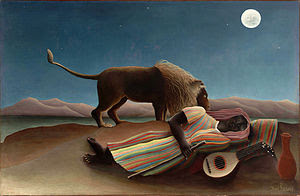We look to experts - the famous, the
respected, the elite, the peer-reviewed, the learned, people who are
supposed to know, the well-paid, the acclaimed, the degreed, the
successful - but feel no hope, see no light. Dry as dust. Same old,
same old. Like that.
 |
| La Bohémienne endormie by Henri Rousseau |
But then some fresh reality, like a
child even, comes along and surprises us with the truth we were
looking for in the wrong places.
I think now of how an art historian,
probably my truest teacher, once described to me how he felt on visiting
an exhibition of Henri Rousseau's paintings. He spoke of the
experience just like a child, directly, purely: “I just felt so
refreshed by it.”
The immediate reality before my eyes
is a newly-published book by Nick Flynn, “The Reenactments,”
in which a theme is that our consciousness is like a series of movies
that run electro-chemically inside our heads. That's the latest
mistaken metaphor for consciousness. That's the exact word being used
- “movies” - not “film” not “cinema” not “shows.” My
best guess is that this latest metaphor is derived from digital
film files such as we download from YouTube or Netflix. It's the very
latest metaphor in the materialist tradition. Quote used by Flynn, p.
47:
HEADLINE:
Scientists Use Brain Imaging to Reveal the Movie in Our Mind (UC
Berkeley News, 2011)
Imagine tapping
into the mind of a coma patient, or watching ones own dream on
YouTube. Using functional Magnetic Resonance Imaging (fMRI) and
computational models, UC Berkeley researchers have succeeded in
decoding and reconstructing people's dynamic visual experiences –
in this case watching Hollywood movie trailers.
As yet, the
technology can only reconstruct movie clips people have already
viewed [in the lab]. However, the breakthrough paves the way for
reproducing the movies inside our heads that no one else sees, such
as dreams and memories, according to researchers.
“This is a
major leap toward reconstructing internal imagery,” said Professor
Jack Gallant, a UC Berkeley neuroscientist and coauthor of the study
published online today in the journal Current Biology. “We are
opening a window into the movies in our minds.”
Now, as you read the original research report, here, a first reaction might be, 'Oh well, I guess these very
sophisticated people know what they are talking about and have
honestly confronted the philosophical/metaphysical assumptions about
perception on which their research is based.
Is there someone inside the head who is
conscious of the movie/consciousness? That's the “simple” but
fundamental question that Flynn and some neurobiologists ask
about this sophisticated scientific research. If consciousness is
assumed to consist of electrochemically-formatted movies, then all
there is is movies about movies! Is there some independent perceiver
of the movies, or is this just same-old solipsism and lack of
acknowledgement of the existence of anyone or thing else outside of one's own
head?
I come back for the millionth time to
love - appreciation of an other - being the basic but missing question of science, as Eben
Alexander might put it, as well as everything else.
A neighbor lady needed some help with
her car yesterday, and after I got it done I picked up and held her
little four-year-old grand daughter who was with her and watching
what was going on. This dear little girl was full of questions and
also wanted to tell me about some gadget her mother had just given
her. I thought that, yes, here is the essence of true non-solipsism.
It was so refreshing. The Berkeley scientists' “breakthrough”
seemed delusional and true-death beside it.
 The latest was my reading of Vi Plotnikoff's stories about a young Doukhobor girl's life in Canada in
the 1950's.
The latest was my reading of Vi Plotnikoff's stories about a young Doukhobor girl's life in Canada in
the 1950's..jpg)
